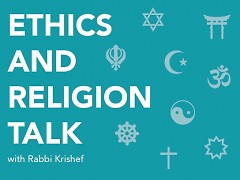This week, we have a second set of responses to the question that Jim V. from Newego wrote to the Ethics and Religion Talk panel at [email protected], asking:
“Does a secular humanist who follows his or her heart and lives in general by the ‘Golden Rule’ have a chance of seeing Heaven, Paradise, gaining eternal life, etc., without the aid or direction of a Holy Book, organized religion, or the guidance of a pastor, minister, priest, imam, rabbi, holy man or woman?”
Last week, we read responses from four Christians. Two quoted texts from the Christian Scriptures demonstrating that the only way to heaven is through faith in Jesus as the Christ, the messiah and savior. The other two quoted a different set of texts, arguing that God has room for non-Christian in the embrace of God’s eternal love and the Kingdom of Heaven. This week, we’ll hear from three non-Christians, beginning with my tradition’s world view.
The standard by which God, according to Judaism, judges human beings at the end of their lives is entirely behavior-based. Jews, bound by the Jewish covenant, have a large variety of commandments (mitzvot), from the Sabbath, Festival days, prayer, and dietary practices, to proper ways to treat other people and the world in which we live. Judaism believes that those who are not bound by the Jewish covenant nonetheless are bound by a set of seven commandments, known as the Noahide laws, including positive commands to worship the one God and no other and to live in a place in which there is a system of justice and courts; and negative commands not to commit blasphemy, murder, steal, commit immoral sexual acts, or eat a limb from a living animal. In all cases, if the individual, with or without the guidance and support of Scripture, a religious community, or clergy, does more good than bad, then he or she goes to heaven; otherwise, not. Proclaiming a belief in God is at most one positive act (and perhaps a motivation to engage in other positive acts), but by itself does not define one’s fate.
The Reverend Colleen Squires, minister at All Souls Community Church of West Michigan, a Unitarian Universalist Congregation, responds:
“There are many Secular Humanist who are members of Unitarian Universalist congregations. Most of them live their lives with a great sense of integrity, wanting to bring their best self forward to make the world a better place for everyone. And I would say they have no concern or interest in the idea of Heaven. They are completely at peace with the notion that when they die there will be no afterlife. While this may be hard for some to grasp secular humanists see death as final.
“This question is really at the heart of Unitarian Universalism. We are often asked ‘what do UUs believe?’ and my response is the better question to ask us is … ‘how do UUs believe?’ It is not what we believe that binds us together but our mutual respect of one another's beliefs, we each have our own path and it is not our place to convert others to our personal beliefs. For example a UU with Christian beliefs would absolutely respect a UU with Humanists understanding of death as being final; there would be no effort to ‘save one’s soul.’ ”
Fred Stella, the Pracharak (Outreach Minister) for the West Michigan Hindu Temple, responds:
“If you start with the foundational belief that every soul is a pure reflection of Divinity then there is never any real separation to begin with; only the appearance of such. Hence, those with secular world views are no less likely to ultimately merge with that Divinity than anyone else. Though it may take one or hundreds of lifetimes, it is the predestined fate of all atmans (souls).
“In Hinduism there is no compulsion in matters of belief. Atheism, agnosticism, etc. can be very healthy steps towards enlightenment. Imagine our minds to be closets filled with, among other things, useless clutter that impedes efficient use of the space. We clean our closets by emptying them completely; then deciding what goes back in and what gets tossed. We then end up with enough room to bring new clothes in. It could be said that the secular humanist is in the emptied closet stage, allowing in only what makes sense when measured with logic, experience and a more refined intuitive belief. Of course, as the writer points out, living a moral, compassionate life is of utmost importance.
“I hold a much greater respect for humanists who come to that conclusion after much personal exploration and sometimes painful analysis than religionists who simply inherit their faith from family and culture with no effort made to truly examine what has been handed them.”
This column answers questions of Ethics and Religion by submitting them to a multi-faith panel of spiritual leaders in the Grand Rapids area. We’d love to hear about the ordinary ethical questions that come up on the course of your day as well as any questions of religion that you’ve wondered about. Tell us how you resolved an ethical dilemma and see how members of the Ethics and Religion Talk panel would have handled the same situation. Please send your questions to
[email protected].
The Rapidian, a program of the 501(c)3 nonprofit Community Media Center, relies on the community’s support to help cover the cost of training reporters and publishing content.
We need your help.
If each of our readers and content creators who values this community platform help support its creation and maintenance, The Rapidian can continue to educate and facilitate a conversation around issues for years to come.
Please support The Rapidian and make a contribution today.
